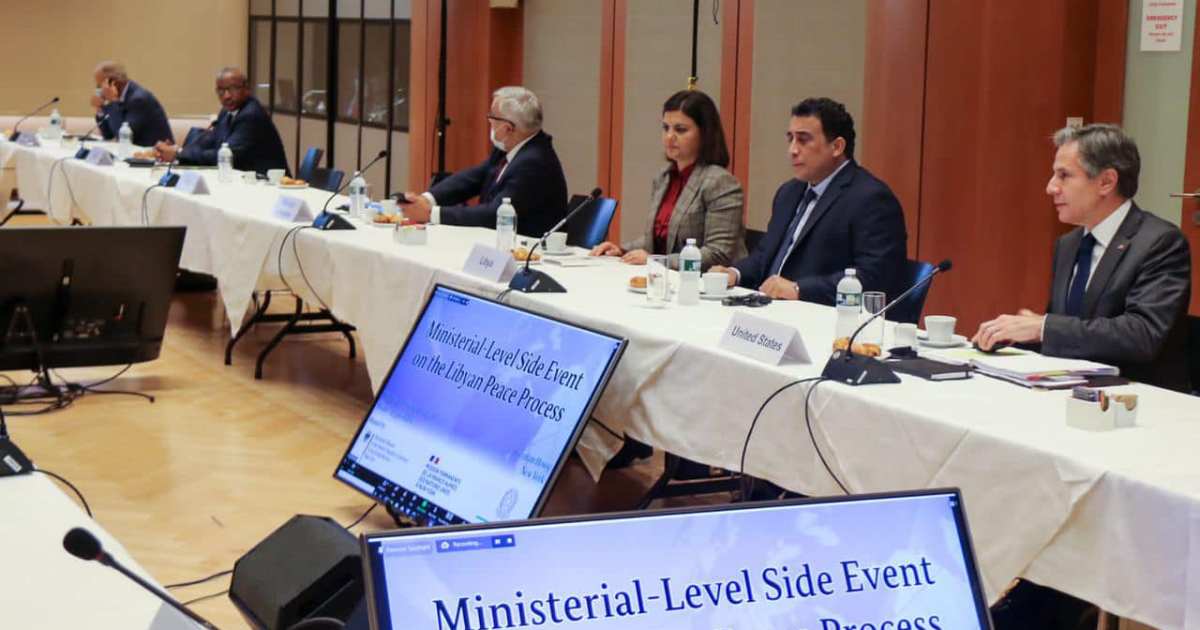US Secretary of State Anthony Blinken confirmed his country's support for the political process in Libya, while retired Major General Khalifa Haftar suspended his military duties in preparation for his candidacy for the presidential elections scheduled for next December.
The media office of the President of the Libyan Presidential Council, Muhammad Al-Manfi, said that "Blinken affirmed during his meeting with the exile - on the sidelines of the Libyan Peace Initiative meeting in New York - his country's support for the continuation of the political process in Libya, according to the Geneva outcomes, especially with regard to the expulsion of mercenaries and foreign forces, from all lands." Libyan".
For its part, the United Nations Support Mission in Libya said - in a tweet - that it had received reports with concern about the Libyan House of Representatives withholding confidence from the Government of National Unity.
The mission emphasized that the current national unity government remains the legitimate government, until it is replaced by another through a regular post-election process.
She added that the government's main focus is on moving the country towards the parliamentary and presidential elections on December 24th.
The UN mission urged the House of Representatives to complete work on the Parliamentary Elections Law within the next week, at the latest.
Turkish support
In turn, Turkish Foreign Minister Mevlut Cavusoglu affirmed his country's support for the national unity government in Libya headed by Abdel Hamid Dabaiba, calling on all Libyan parties to act responsibly and focus on the country's priorities.
The Turkish Foreign Ministry said - in a statement - that Cavusoglu renewed, during a phone call with Dabaiba, today, Wednesday, Turkey's support for the national unity government, in response to the Libyan House of Representatives' decision to withdraw confidence from it.
The statement also stressed the importance of the national unity government continuing to work with its full powers, until the elections are held on time as planned.
He stressed the need for the Libyan parties to abandon conflicts of personal interests, and to stay away from sterile discussions of legitimacy, as the statement put it.
Haftar prepares to run
In a related context, retired Libyan Major General Khalifa Haftar decided today, Wednesday, to assign the Chief of Staff of his forces, Abdel Razek Al-Nadori, to the position of the so-called "Commander-in-Chief of the Army" in his place, in preparation for his running in the presidential elections on December 24, according to local media.
Local non-governmental media, including the "Al-Marsad" newspaper and "218" channel, stated that Haftar decided to assign the Chief of Staff of his forces, Lieutenant-General Abdel Razek Al-Nadori, to the position of Commander-in-Chief of the Army (Haftar's militia) instead for a period of 3 months.
This period begins on September 23, which falls on Thursday, and ends on December 24, which is the date set for the start of the electoral process in Libya.
This step comes less than a day after the parliament's decision to withdraw confidence from the interim government, which was rejected by the United Nations and various Libyan political parties.
Significant differences have prevailed since Parliament Speaker Aguila Saleh announced his ratification of a presidential election law early this month, which appears to be tailored to Khalifa Haftar.
The law - which was rejected by the Supreme Council of State (a second chamber of Parliament) - was not submitted to a vote in an official session, but was approved by the Speaker of Parliament alone.
The law, consisting of 77 articles, published on the ninth of this September - bearing No. 1 of 2021 and signed by the Speaker of the House of Representatives - regulates the presidential elections scheduled for December 24 next.
A controversial article in this law refers to the possibility of any military or civilian running for the position of president on the condition that he “stop working and exercising his duties three months before the election date,” and in the event that he is not elected, he “returns to his previous work.”

